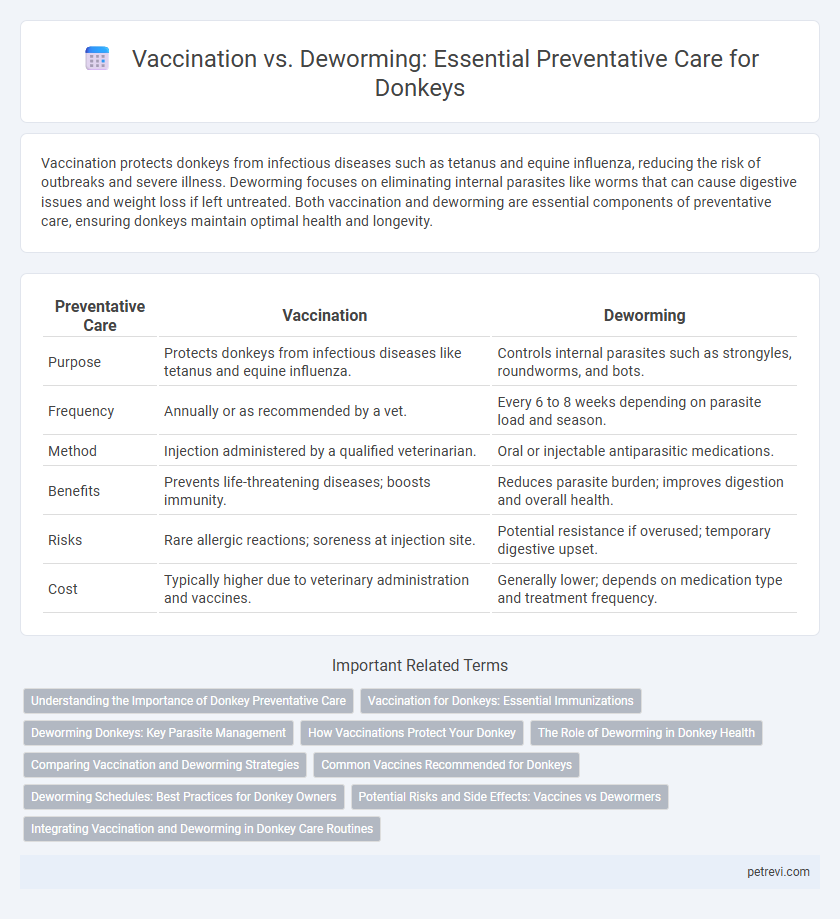Vaccination protects donkeys from infectious diseases such as tetanus and equine influenza, reducing the risk of outbreaks and severe illness. Deworming focuses on eliminating internal parasites like worms that can cause digestive issues and weight loss if left untreated. Both vaccination and deworming are essential components of preventative care, ensuring donkeys maintain optimal health and longevity.
Table of Comparison
| Preventative Care | Vaccination | Deworming |
|---|---|---|
| Purpose | Protects donkeys from infectious diseases like tetanus and equine influenza. | Controls internal parasites such as strongyles, roundworms, and bots. |
| Frequency | Annually or as recommended by a vet. | Every 6 to 8 weeks depending on parasite load and season. |
| Method | Injection administered by a qualified veterinarian. | Oral or injectable antiparasitic medications. |
| Benefits | Prevents life-threatening diseases; boosts immunity. | Reduces parasite burden; improves digestion and overall health. |
| Risks | Rare allergic reactions; soreness at injection site. | Potential resistance if overused; temporary digestive upset. |
| Cost | Typically higher due to veterinary administration and vaccines. | Generally lower; depends on medication type and treatment frequency. |
Understanding the Importance of Donkey Preventative Care
Vaccination and deworming are essential components of donkey preventative care that protect against infectious diseases such as tetanus and control internal parasites like strongyles, which can cause severe health issues. Regular vaccination schedules tailored to donkeys' specific risks, combined with strategic deworming based on fecal egg counts, optimize immune response and reduce parasite resistance. Prioritizing these measures promotes long-term health, prevents costly veterinary treatments, and ensures donkeys remain robust for work or companionship.
Vaccination for Donkeys: Essential Immunizations
Vaccination for donkeys includes essential immunizations against tetanus, equine influenza, and equine herpesvirus, which are critical for preventing life-threatening diseases. Regular vaccination schedules tailored to donkey-specific immune responses boost overall herd health and reduce the spread of infectious pathogens. Maintaining up-to-date vaccinations ensures donkeys' resilience to common equine diseases, supporting longevity and productivity.
Deworming Donkeys: Key Parasite Management
Effective deworming in donkeys targets gastrointestinal parasites such as strongyles, ascarids, and pinworms, significantly reducing the risk of colic and weight loss. Regular fecal egg count tests guide strategic deworming schedules, optimizing parasitic control while minimizing drug resistance. Integrating pasture management and rotational grazing enhances the overall efficacy of parasite management in donkeys.
How Vaccinations Protect Your Donkey
Vaccinations protect donkeys by stimulating their immune system to develop antibodies against specific infectious diseases such as tetanus, equine influenza, and West Nile virus, reducing the risk of severe illness or death. By preventing the onset of contagious conditions, vaccinations help maintain overall health, enhance longevity, and ensure better performance in working or companion donkeys. Regular vaccination schedules, tailored to regional disease prevalence, are crucial for effective preventative care in donkeys.
The Role of Deworming in Donkey Health
Deworming plays a critical role in maintaining donkey health by eliminating internal parasites that can cause weight loss, colic, and poor coat condition. Regular fecal egg count testing helps determine parasite load and guides targeted deworming strategies, reducing the risk of resistance buildup. Combining deworming with appropriate vaccination protocols enhances overall preventative care and supports long-term wellness in donkeys.
Comparing Vaccination and Deworming Strategies
Vaccination for donkeys primarily targets viral and bacterial infections such as tetanus and equine influenza, establishing immunity and preventing disease outbreaks. Deworming focuses on controlling internal parasites like strongyles and roundworms, which can impair digestion and overall health if left unchecked. Effective preventative care balances timely vaccinations with strategic deworming schedules based on fecal egg count monitoring to optimize donkey health and reduce resistance risks.
Common Vaccines Recommended for Donkeys
Common vaccines recommended for donkeys include tetanus, equine influenza, and equine herpesvirus, targeting diseases that can cause severe illness or even death. Vaccination protocols should be tailored based on regional disease prevalence and the donkey's exposure risk to ensure effective immunity. Regular deworming complements vaccination by controlling internal parasites, which can weaken the immune system and reduce vaccine efficacy.
Deworming Schedules: Best Practices for Donkey Owners
Effective deworming schedules for donkeys are crucial in preventing parasitic infections and maintaining overall health. Experts recommend administering anthelmintics every 8 to 12 weeks, with adjustments based on regional parasite prevalence and fecal egg count monitoring. Integrating routine fecal exams alongside strategic deworming enhances prevention and minimizes drug resistance risks in donkey care.
Potential Risks and Side Effects: Vaccines vs Dewormers
Vaccination in donkeys carries potential risks such as localized reactions, allergic responses, and, in rare cases, systemic illness, necessitating careful selection based on the animal's health status and regional disease prevalence. Deworming can lead to side effects including gastrointestinal upset, resistance development among parasites, and toxicity if dosages are incorrect, highlighting the importance of targeted parasite control and diagnostic fecal egg counts. Balancing vaccination and deworming schedules reduces overall health risks and optimizes preventative care in equine management.
Integrating Vaccination and Deworming in Donkey Care Routines
Integrating vaccination and deworming in donkey care routines enhances overall health by addressing both infectious diseases and parasitic infestations systematically. Regularly scheduled vaccinations prevent common viral and bacterial infections, while targeted deworming controls gastrointestinal parasites, reducing the risk of colic and weight loss. Coordinating these preventive measures maximizes immune response efficacy and promotes longevity in donkeys.
Vaccination vs Deworming for Donkey Preventative Care Infographic

 petrevi.com
petrevi.com